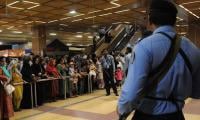“We have a governing class that has turned Pakistan or is attempting to turn Pakistan into a homogenous state,” said former Senate chairman Raza Rabbani on Monday while addressing a dialogue at the Ziauddin University.
‘Jinnah’s Vision of Pakistan: 75 Years of Independence and it Still Remains a Distant Dream’, the 14th in an interactive series of ZU Dialogues, explored the current state of the country and demonstrated how completely different Quaid-e-Azam Muhammad Ali Jinnah’s vision is from it.
Outlining a few resolutions and establishing distinctions between Pakistan’s past and present, Rabbani explained Jinnah’s vision in the most straightforward terms possible, saying that 75 years down the line we have a welfare state that has been converted into a national security state.
“There have been times when the constitution was suspended, we have had military dictatorships, and there have been times when the presidential system of government has been in effect. These are the many stages to democratic dominance.”
He said that from a state that has cultural variety because it is naturally, ethnically and culturally varied, we are heading towards becoming a homogeneous state. Institute of Historical & Social Research Director Prof Dr Syed Jaffer Ahmed said: “Without understanding the historical context and social milieu of Jinnah, it’s impossible to comprehend his vision. Even surpassing one of the greatest leaders, Mustafa Kemal Ataturk, I think Jinnah was the greatest Muslim leader of the 20th century.”
Dr Ahmed said: “Jinnah was also a modernist who was influenced by Western ideas of democracy. While serving in the Indian Legislative Assembly, he repeatedly urged the British rulers to grant our parliament the same level of autonomy as their own parliamentary system.”
He said that in a brief speech on August 11, Jinnah referred to the Pakistani parliament as the supreme parliament of Pakistan, using the phrase three times.
Senior journalist, writer and social activist Ghazi Salahuddin said: “There are some issues that haven’t been resolved. As an illustration, Jinnah said in his speech ‘you are free to go to your temples, you are free to go to your mosques or to any other places of worship in this state of Pakistan’, but what he really meant to say was that the government shouldn’t be involved in the matters of religion.”
Salahuddin said: “We claim that Jinnah gave us a secular state, but it also interferes with Pakistan’s movement. Few students attend general history lessons in schools and universities, and those who do tend to overlook Pakistani history and poorly transmit it. Instead, you should revisit history, comprehend it and form your own opinion of Pakistan.”
Earlier, ZU Pro-chancellor Dr Nida Hussain said in her welcome speech that Pakistan is going through its worst political, constitutional and economic crisis, and it is a conversation that is now a part of everyone’s daily life.
ZU Vice Chancellor Prof Dr Syed Irfan Hyder said in his concluding remarks that the fact that none of the countries similar to Pakistan are democratic and independent is proof that we neglected the point in the room during this conversation. “Although we live in a post-colonial world, we’re still subject to the dictates of the point in the room.”
A representational image of a handcuffed man. — APP/FilePolice have arrested a man allegedly involved in the murder...
An representative image of narcotics seized by the Sindh Narcotics Control Department.—...







